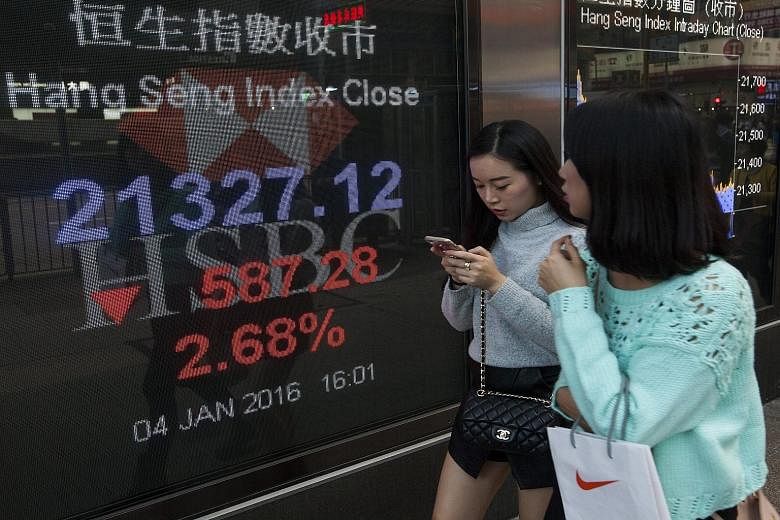BEIJING • The list of reasons for global investors to avoid Chinese shares in Hong Kong keeps getting longer.
Already beaten down by China's economic slowdown, a falling yuan and vanishing top executives, so-called H shares now face a new threat: the impact of circuit breakers on the mainland.
The Hang Seng China Enterprises Index fell as much as 4.4 per cent on Monday after trading halts in Shanghai and Shenzhen spurred investors to shift sell orders to Hong Kong.
"Now it is up to Hong Kong to carry the burden, as traders who cannot sell their mainland portfolio will likely use Hong Kong," said Mr Hao Hong, chief China strategist at Bocom International in the city, who called both the boom and bust in mainland share prices last year. "Many traders are disenchanted."
The H-share gauge plunged 19 per cent in 2015, leading declines in Asia, as the Communist Party's efforts to stem a rout in mainland equities had less impact across the border. The government's sanction of a weakening yuan is exacerbating a deteriorating earnings outlook for Hong Kong dollar-priced shares as the economy slows.
An anti-graft campaign that has led to the disappearance or arrest of some of China's most high-profile corporate executives is adding to foreign investor concerns.
Chinese shares in Hong Kong were already declining on Monday after data showed the mainland's manufacturing contracted for a fifth straight month.
Losses escalated when a 5 per cent drop in the CSI 300 Index triggered a 15-minute suspension, and deepened further as trading was halted on mainland exchanges for the rest of the day.
Stocks slid yesterday, even as state-controlled funds bought equities and the securities regulator signalled a selling ban on major investors will remain beyond this week's expiration date, according to people familiar with the matter. The Hang Seng China Enterprises Index fell 1.1 per cent.
Hong Kong's bourse will introduce a volatility-control mechanism as soon as this year that would prevent an individual stock from moving 10 per cent or more during a five-minute period, once a session. Stocks traded in the city are not subject to any daily price limits now.
Monday was not the first time investors have targeted Hong Kong amid shutdowns in mainland equities. The Hang Seng China Enterprises plunged as much as 9.4 per cent on July 8, its biggest loss since 2008, as mainland officials allowed more than 1,400 companies to halt trading on the Shanghai and Shenzhen exchanges, locking sellers out of half the market.
Foreign banks doubt the ability of China's new system to calm price swings. Goldman Sachs said circuit breakers will not notably reduce volatility given that retail investors dominate turnover, and Citigroup said the mechanism is too conservative.
But China Securities Regulatory Commission spokesman Deng Ge yesterday said the measures play an important role in stabilising the market, and that the authorities will keep improving the system.
"The circuit breaker may increase selling pressure," said Mr Castor Pang, head of research at Core-Pacific Yamaichi Hong Kong. When mainland shares get "halted, investors are using Hong Kong to hedge their positions".
BLOOMBERG

